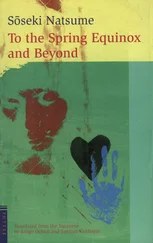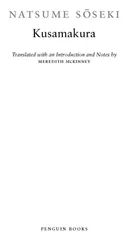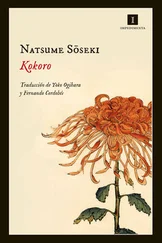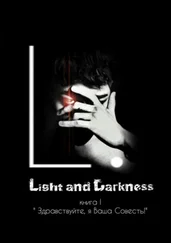Perhaps the last sentence in the novel will serve as an illustration of what I was at pains to achieve throughout. The final installment concludes: “On the way back to his room, Tsuda attempted to explain the meaning of [Kiyoko’s] smile.” Straightforward enough, but for an adverbial phrase that I omitted here, hitori de , which normally connotes “by himself/myself,” as in “I went to the movies by myself,” or sometimes potentiality, “I can do it by myself.” From the first time I read the sentence, I had an uncomfortable feeling about the phrase, as if it were somehow out of place, and considered eliminating it from my final draft. Then I had the opportunity to examine Sōseki’s original manuscript in Tokyo and saw, turning to the last page, that he had inserted hitori de as an afterthought with a circle around it and an arrow — had gone out of his way, I should say, of adding it. The emendation was inked in his own hand as though emphatically, making me feel that ignoring it was not an option, and I modified my English sentence: “On the way back to his room, Tsuda attempted alone with himself to explain the meaning of [Kiyoko’s] smile.” I don’t deny that there is something awry about the revision, a grain of sand beneath the eyelid. But if it now conveys the sense that Tsuda has only himself to rely on in his effort to solve the mystery, it will come closer to the effect of the original sentence on the Japanese reader, and I will have achieved, momentarily at least, my own version of fidelity.
J. N.
 FINISHED WITH his probe, the doctor helped Tsuda down from the examination table.
FINISHED WITH his probe, the doctor helped Tsuda down from the examination table.
“It appears the lesion extends all the way to the intestine. Last time I felt the ridge of a scar and assumed it stopped there, but when I scraped away just now to help it drain, I see it’s deeper.”
“To the intestine?”
“Yes. What I thought was less than two centimeters appears to be more than three.”
A flush of disappointment rose faintly to Tsuda’s face beneath his strained smile. The doctor shook his head, his hands clasped in front of him against his baggy white smock. “It’s too bad but it’s the reality we have to face,” he might have been saying. “A doctor can’t compromise professional standards with a lie.”
Tsuda retied his obi in silence and turned again to face the doctor, lifting his hakama * from the back of a chair where he had dropped it.
“If it’s all the way to the intestine there’s no way it’ll heal?”
“There’s no reason to think that.”
The doctor’s denial was emphatic and unhesitating, as if to invalidate Tsuda’s mood at the same time.
“It does suggest we’ll have to do more than just clean the canal as we’ve been doing. Since that won’t get us any new tissue our only option is a more fundamental approach.”
“Meaning?”
“Surgery. We’ll resect a portion of the canal and connect it to the intestine. That will allow the resected ends to knit naturally and you’ll be, well, almost as good as new.”
Tsuda nodded without speaking. Next to where he stood, a microscope sat on a table that had been installed beneath a window facing south. Entering the examination room earlier, his curiosity had prompted him to ask the doctor, with whom he was on familiar terms, if he could have a look. What he had seen through the 850-power lens were grape-shaped bacteria as vividly colored as if they had been photographed.
Fastening his hakama , Tsuda reached for the leather wallet he had placed on the same table and abruptly recalled the bacteria. The association was a breath of uneasiness. Having inserted the wallet inside his kimono in preparation to leave, he was on his way out when he hesitated.
“If it’s tuberculosis, I suppose it wouldn’t heal even if you performed what you call fundamental surgery?”
“If it were tubercular, no. In that case it would burrow straight in toward the intestine so that just treating the opening would be ineffective.”
Tsuda winced involuntarily.
“But mine isn’t tubercular?”
“That’s right.”
Tsuda looked hard at the doctor for an instant, as if to determine the degree of truth in what he was saying. The doctor didn’t move.
“How do you know? You can tell from just an examination?”
“That’s right — from how it looks.”
Just then the nurse, standing at the entrance to the room, called the name of the next patient, who had been waiting for his turn and immediately appeared in the doorway. Tsuda was obliged to exit quickly.
“So when can I have this surgery?”
“Any time. Whenever it suits you.”
Promising to pick a date after thinking it over, Tsuda stepped outside.
 ON THE streetcar home, he was feeling low. Wedged into the crowded car with no room to move, gripping the overhead strap, he directed his thoughts inward. Last year’s screeching pain rose vividly to the stage of his memory. He saw distinctly his own pathetic figure laid out on the white bed. He heard clearly his own moaning, a sound that might have issued from a dog unable to break its chain and run away. And then the glitter of the cold blade, the metallic clink of scalpel against speculum, a pressure so powerful that it squeezed the air out of both his lungs in a single gasp, and a riotous agony that felt as if it could only have come from the impossibility of expressing the air as it was being compressed — these impressions assaulted his memory all at once.
ON THE streetcar home, he was feeling low. Wedged into the crowded car with no room to move, gripping the overhead strap, he directed his thoughts inward. Last year’s screeching pain rose vividly to the stage of his memory. He saw distinctly his own pathetic figure laid out on the white bed. He heard clearly his own moaning, a sound that might have issued from a dog unable to break its chain and run away. And then the glitter of the cold blade, the metallic clink of scalpel against speculum, a pressure so powerful that it squeezed the air out of both his lungs in a single gasp, and a riotous agony that felt as if it could only have come from the impossibility of expressing the air as it was being compressed — these impressions assaulted his memory all at once.
He felt miserable. Shifting his focus abruptly, he cast an eye around him. The passengers near him were impassive, not even aware of his existence. He turned his thoughts back on himself.
Why did I have such an agonizing experience?
On his way home from viewing cherry blossoms at the Arakawa Wharf, the pain had struck with no warning, its cause a mystery to him. It wasn’t strange so much as terrifying. There’s no guarantee that a change won’t occur in this body of mine at any hour of any given day. For that matter, some sort of change could be taking place even now. And I myself have no idea. Terrifying!
Having proceeded this far, his mind was unable to stop. With the force of a powerful blow to the back it jolted him forward. Abruptly he called out silently inside himself:
It’s the same with the mind. Exactly the same. There’s no knowing when or how it will change. I’ve witnessed such a change with my own eyes .
Pursing his lips, he glanced around him with the eyes of a man whose self-esteem has been injured. But the other passengers were oblivious of what was happening inside him and paid no heed to the look in his eyes.
Like the streetcar he was riding, his mind merely moved forward on its own tracks. He recalled what his friend had told him a few days ago about Poincarré. Having explained “probability” for his benefit, his friend had turned to him and spoken as follows:
“So you see, what you commonly hear described as chance, an accident, a chance occurrence, is really just a case where the actual cause is too complex to grasp. For a Napoleon to be born, an extraordinary sperm must unite with an extraordinary egg; but when you start considering the circumstances that were required to create that necessary union it boggles the imagination.”
He was unable to dismiss his friend’s words as merely a fragment of new knowledge that had been imparted to him. Thinking about how closely they fit his own circumstances, he seemed to become aware of a dark, imponderable force pushing him left when he meant to go right or pulling him back when he meant to go forward. Until that moment, he would have felt certain that his actions had never been subject to restraint by others. He had been certain that he did whatever he did of his own accord, that everything he said he intended to say.
Читать дальше
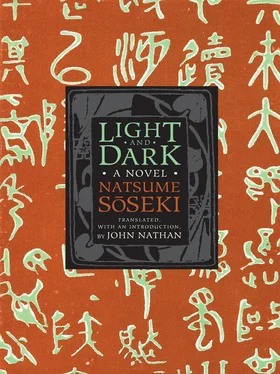
 FINISHED WITH his probe, the doctor helped Tsuda down from the examination table.
FINISHED WITH his probe, the doctor helped Tsuda down from the examination table. ON THE streetcar home, he was feeling low. Wedged into the crowded car with no room to move, gripping the overhead strap, he directed his thoughts inward. Last year’s screeching pain rose vividly to the stage of his memory. He saw distinctly his own pathetic figure laid out on the white bed. He heard clearly his own moaning, a sound that might have issued from a dog unable to break its chain and run away. And then the glitter of the cold blade, the metallic clink of scalpel against speculum, a pressure so powerful that it squeezed the air out of both his lungs in a single gasp, and a riotous agony that felt as if it could only have come from the impossibility of expressing the air as it was being compressed — these impressions assaulted his memory all at once.
ON THE streetcar home, he was feeling low. Wedged into the crowded car with no room to move, gripping the overhead strap, he directed his thoughts inward. Last year’s screeching pain rose vividly to the stage of his memory. He saw distinctly his own pathetic figure laid out on the white bed. He heard clearly his own moaning, a sound that might have issued from a dog unable to break its chain and run away. And then the glitter of the cold blade, the metallic clink of scalpel against speculum, a pressure so powerful that it squeezed the air out of both his lungs in a single gasp, and a riotous agony that felt as if it could only have come from the impossibility of expressing the air as it was being compressed — these impressions assaulted his memory all at once.
